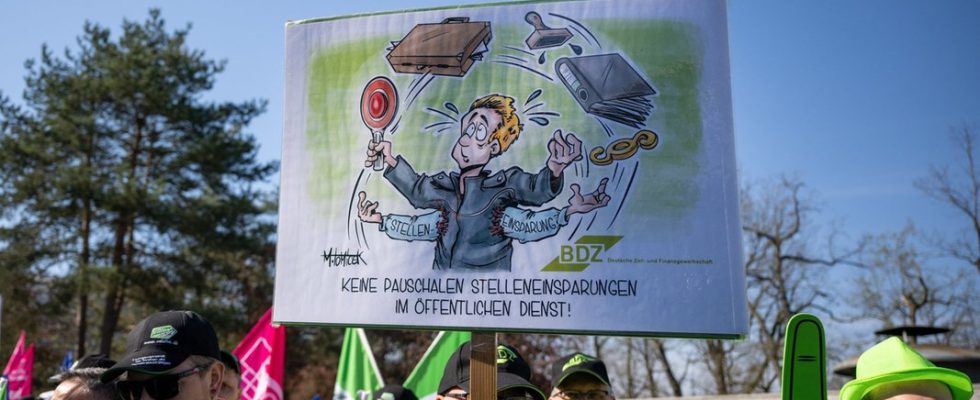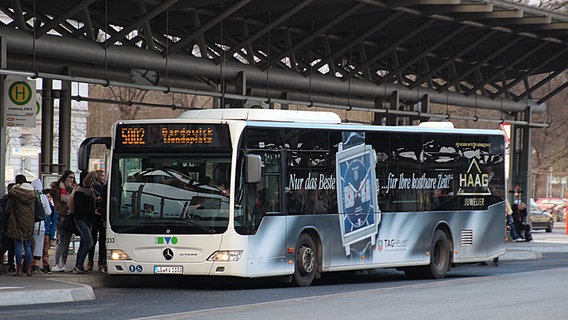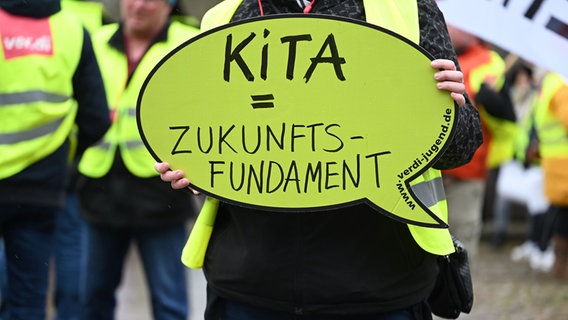Status: 04/23/2023 4:49 p.m
After tough collective bargaining, the federal government, local authorities and trade unions have come to an agreement: around 2.5 million employees in the public sector (TVöD) will benefit from the collective agreement. Indefinite strikes are off the table.
As all parties involved announced late Saturday evening in Potsdam, the key points of the agreement are as follows:
- A tax- and social security-free inflation compensation allowance of 3,000 euros in several stages. EUR 1,240 of this is to be paid out this June, followed by a further EUR 220 in each of the months from July to February 2024.
- From March 1, 2024: increase in table fees by 200 euros (basic amount) and then by 5.5 percent. If no increase of 340 euros is achieved, the relevant increase amount should be set to this sum.
- Training and internship fees will be increased by 150 euros at the same time.
- The term of the agreement is to be 24 months.
A total of more than 2.5 million employees are affected by the collective agreement for the public sector (TVöD). These include people who work as educators, bus drivers, pool employees, firefighters, nurses and geriatric nurses, administrative employees, sewage treatment plant employees, foresters or doctors.
Ver.di on collective bargaining: Went to the pain threshold
With this solution, the parties to the collective bargaining largely based themselves on the compromise proposal from the arbitration proceedings that ended a week ago. “We have accommodated the unions as much as we can still be responsible for in a difficult budget situation,” said Interior Minister Nancy Faeser (SPD) after the round of negotiations. According to Ver.di boss Frank Werneke, the negotiations were not easy. “With our decision to make this compromise, we went to the pain threshold,” he said. However, Werneke expressed his conviction that he could win the members over to the agreement.
Lower Saxony’s ver.di spokesman Morchner criticizes the long term
It is positive that the conclusion from March 2024 would mean a table-effective increase of up to 16.9 percent – the vast majority of employees would receive an increase of over 11 percent, said Lower Saxony’s ver.di spokesman Tobias Morchner of the NDR Lower Saxony. However, the result also has weaknesses. This includes the long term and the relatively late table-effective increase. Now, at the beginning of May, the ver.di members would have to vote on whether to accept the wage agreement. On May 15th, the Federal Collective Bargaining Commission for the Public Service will decide.
Mixed reactions from Mecklenburg-Western Pomerania
For the district administrator of the Mecklenburg Lake District, Heiko Kärger (CDU), the agreement in the wage dispute is a relief. He is pleased that there have been no strikes lasting several days. Kärger also sees that municipal budgets will be burdened with the tariff increase, but is convinced that no voluntary benefits and investments will have to be cut. At Ver.di, not all members are satisfied with the result, according to the press spokesman for the Ver.di North district, Frank Schichefsky. Above all, they criticize the actual tariff increase as too low.
Further information
Collective bargaining: Municipalities expect additional costs of 17 billion euros
The agreement that has been reached poses particular challenges for the many cash-strapped municipalities. The President of the Association of Municipal Employers’ Associations, Karin Welge, had estimated the additional costs for cities and municipalities on the basis of the arbitration proposal at 17 billion euros before the negotiations.
Indefinite strike after wage agreement off the table
A strike ballot among the unions and possible indefinite strikes are off the table with the agreement. The bargaining parties have been negotiating with each other for months. Again and again, the employee representatives had paralyzed administrations, city cleaning and swimming pools with nationwide warning strikes. At the end of March, ver.di, together with the railway and transport union (EVG), brought both rail and air traffic to a standstill nationwide during a large-scale warning strike.
Further information





